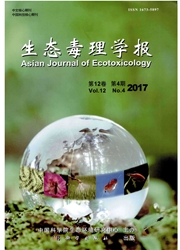

 中文摘要:
中文摘要:
四氯苯醌(TCBQ)是高毒致癌化合物,而表没食子儿茶素没食子酸酯(EGCG)是茶叶中主要的茶多酚活性成分。利用人肝癌细胞系HepG2细胞,通过细胞存活率MTT毒性实验,探讨EGCG是否能解除TCBQ的毒性作用。实验结果表明,低浓度(5~40μmol·L-1)的EGCG对TCBQ(200μmol·L-1)导致的细胞毒性有一定的缓解作用。此保护与EGCG和TCBQ之间的直接相互作用有关,紫外吸收光谱及高效液相色谱分析的实验结果表明EGCG降低TCBQ毒性的原因可能是其促使TCBQ还原为四氯氢醌TCHQ,并延缓了TCHQ的自氧化过程。
 英文摘要:
英文摘要:
Tetrachloro-1,4-benquinone(TCBQ) is a highly toxic and carcinogenic compound. In this study, cell viability was assessed using MTT assay with human hepatoma cell line HepG2 cell to investigate whether epigallocatechin gallate(EGCG), one of the main active components in tea, could reduce the cytotoxicity induced by TCBQ. Experimental results demonstrated that EGCG at low concentration(5 ~ 40 μmol·L-1) could mitigate the cytotoxicity induced by TCBQ(200 μmol·L-1). This protective effect may be attributed to the direct interaction between EGCG and TCBQ. UV-vis absorption spectra and high performance liquid chromatography analysis demonstrated that EGCG could expedite the reduction of TCBQ to less toxic tetrachlorohydroquinoe(TCHQ), and inhibit the autooxidation of TCHQ.
 同期刊论文项目
同期刊论文项目
 同项目期刊论文
同项目期刊论文
 期刊信息
期刊信息
